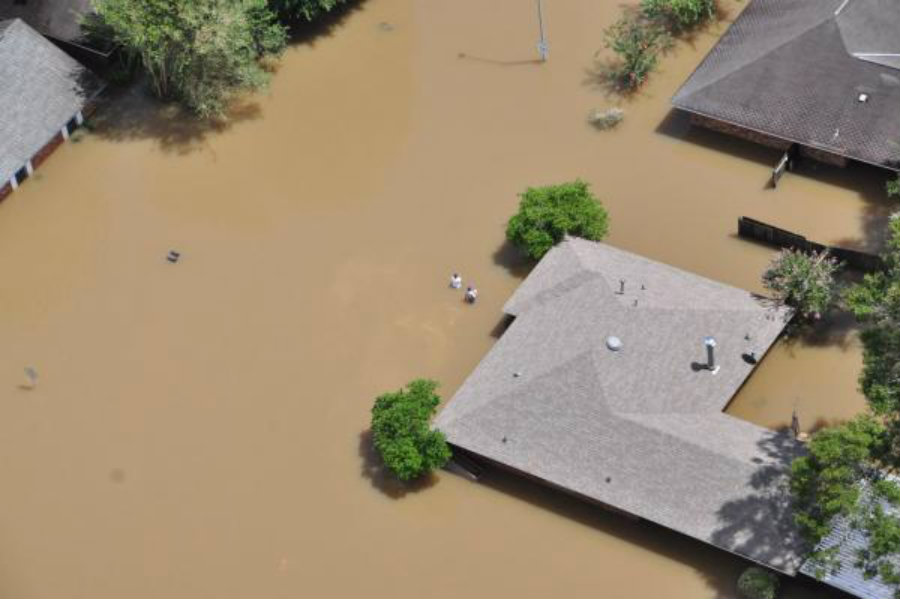US President Barack Obama visited Baton Rouge, Louisiana, Tuesday, August 23, after his vacation in Martha’s Vineyard.
Obama has received great criticism for having chosen to complete his holiday before tending to the natural disaster that left thousands devastated and homeless in the city. The flood that took place last week is said to be the worst disaster to hit the country since 2012’s Hurricane Sandy and according to the Red Cross will cost at least $30 million to repair the damage caused.

Although the state was happy to receive the President, they criticized his overdue visit. According to Baton Rouge’s newspaper, The Advocate, Obama should have cut his vacation short and immediately gone to see the devastation with which numerous residents were faced.
Republican candidate Donald Trump also shook his head at the President’s decision to continue golfing while numerous people suffered. He stated Obama’s visit was “too late.” Trump, who flew to the state last week with his right-hand man, Mike Pence, did what any popular presidential candidate would do to earn points toward the upcoming elections: he toured the flood damage, met with church groups and distributed supplies at a local high school.
Obama’s delayed response to the disaster is linked to how an indifferent George W. Bush reacted to Hurricane Katrina, a previous natural disaster that shook New Orleans in 2005. Bush’s apathetic response disappointed many across the nation. Instead of tugging at the strings of a guitar in San Diego, he ought to have hastily attended to the matter at hand that cost thousands their lives and much more the loss of all their possessions.
Although, one person did not seem to be outraged by the President’s tardiness. Louisiana’s Democratic Governor, John Bel Edwards, had previously stated that he hoped Obama would hold his trip to the state for another few weeks because the protocol required for a presidential visit would employ the already scarce resources that should be reserved for the state’s recovery from the flood.
Effects of the flooding
Louisiana saw more than 40,000 homes destroyed, leaving numerous families deserted in their hometowns. CNN Money reported that most victims of the flooding most probably are not insured for their possessions. The Federal Emergency Management Agency (FEMA) oversees the National Flood Insurance Program and found that only 42 percent of structures in Louisiana’s high-risk areas are covered for floods, whereas areas located outside of designated flood zones are covered for 12,5 percent.

Representatives from the Governor’s Office of Homeland Security and Emergency Preparedness, FEMA, and other agencies, including volunteer groups, are playing an important role in disaster assistance, supporting residents with low-interest disaster loans aimed at homeowners and renters. Furthermore, these loans are also provided by the US Small Business Administration for businesses of all sizes, including but not limited to landlords and private non-profit organizations.
The impact of the floods has proven to be greater than expected, where even people residing in non-designated flood zones have been some of those hit the hardest, making 106 000 the total number of people seeking disaster aid.
National media criticized
Civilians and representatives of publication houses in Louisiana state have been criticizing national media for failing to cover the disaster adequately.
“It’s a matter of raising awareness,” Mike Scott, a movie critic for NOLA.com | The Times-Picayune, told CNN Money.
That, although the flood may not have a name and the media is still winding down after all the excitement of the Rio Olympics, yet still in the midst of political campaign madness, it is still important that people be informed about the happenings in the state and that they be sensitive to the suffering of tens of thousands.
Editor and vice-president of content for NOLA.com | The Times-Picayune, Mark Lorando, rightfully pointed out that media coverage of the incident could help with recovery.
“Nobody here is complaining that no one is paying attention to them. People here are concerned that our recovery is going to be stunted by the lack of awareness of what’s happening,” he stated.
Louisiana is home to one of the highest minority populations in the US, where about 40.7 percent of residents are of social minority groups, according to an article published by the Business Report in June last year. Of these social minority groups, African-Americans are the highest. It is because of this demographic fact that many are feeling that the level of recognition they received is insufficient. Both during Bush’s presidency with Hurricane Katrina and Obama’s with this flooding, not to mention the incidents of police brutality one of which involving the killing of an African-American man by police officials, residents of this state have long felt shunned by those who are supposed to have their interests at heart.
Source: CNN
